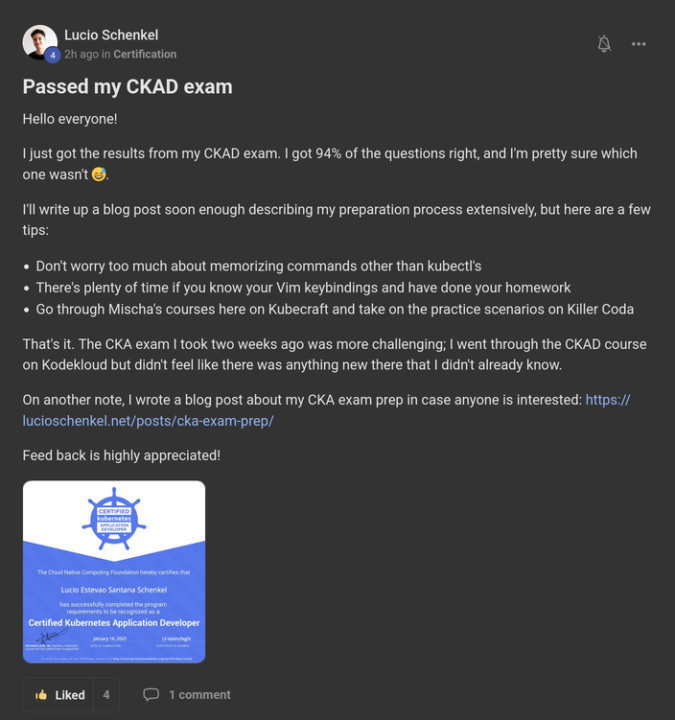Activity
Mon
Wed
Fri
Sun
Jan
Feb
Mar
Apr
May
Jun
Jul
Aug
Sep
Oct
Nov
Dec
What is this?
Less
More
Memberships
KubeCraft (Free)
11k members • Free
52 contributions to KubeCraft (Free)
Why do YOU want to become a DevOps Engineer? 🔥
Let's talk about DevOps. I know many of you are eager to become a DevOps Engineer, or are trying to get more pay and job satisfaction. What is it about DevOps that attracts YOU? Here are some of my reasons: - Innovative tech 📈 - I love to Automate, Code & work with Kubernetes 🤖 - Amazing pay 💰 - Thriving job opportunities 👊 - High-demand within the AI industry 💸 Comment your reasons below. 👇 How to get there? + Join the KubeCraft community, + Learn the right Tech that companies want + Know how to market yourself (Avoid the mistakes others are making!) + Get a high-paid DevOps job Comment your reasons below. 👇

3 likes • Feb 12
@Sebastian Kargl You're asking a good question. What comes to your mind when someone uses this term ? You probably have an idea of it that matches what other people imagine too. TL;DR: They are the wise mature hard workers who know the job, and they are the leaders who get the job done. They are loyal, smart, reliable. They solve or anticipate problems. They are athletic swimmers in the complexity. They replace confusion with clarity so people around them feel more confident and capable. By deduction seniority can be defined as a professional rank for people of experience with both serious engineering skills, and proven, extended leadership skills. --------------------------- Now I will list what comes to my mind when I hear about a senior software/IT engineer. Of course, it applies to DevOps talents. In my mind, such a person is seasoned which means that he has at least 4 years of experience in is current role, or in similar positions. We're talking about experience, not age because. Is some countries you are only considered senior after 8 or even ten years of experience. Also, in my mind, this person has multiple work experiences in more than one company our multiple work experiences with different teams with different kinds of expectations if works in a big company. He/she is able to adapt his problem solving skills to any changing situation, expected,or un expected. This person is able to work with different teams, can even work on multiple projects with different teams at the same time by efficiently switching from one project to another, and one technical context to another. This person is efficient. He/she masters time management and delivers on expectations or exceeds expectations or has understandable reason when not delivering. This person is highly productive, understands the how and the why's of every situation so explaining, reporting and documenting is done on time, easily. This person is technically skilled and is able to train, lead, manage, teach, communicate about technical needs and ongoing technical processes, issues and developments.
Why I left a nursing career for tech
I was making $40K as a nurse, barely getting by. Today I'm a 6-figure DevOps engineer. But this isn't about money. It's about finding work that lights you up. I discovered tech through necessity. Started tinkering with an old laptop. Found joy in solving problems. Building things from scratch. The journey wasn't easy: • Learning after long nursing shifts • Doubting myself constantly • Facing rejection after rejection • Starting over in my 30s But every Linux command mastered... Every container deployed... Every cloud certification earned... Built confidence. Today I help others make this transition. Run a community of exceptional engineers. Watch careers transform. Lives change. The secret? It's not about being the smartest. It's about being the most persistent. You're never too old to start. Never too inexperienced to learn. Never too far gone to change. The best time to start was yesterday. The second best time is now.
Escape the coding maze
As people keep asking about learning more programming languages, I want to share some helpful advice. As you probably know, Misha recently told us, “Skip Rust, thank me later”. He is right. Python is enough, and we should master our DevOps art before adding new strings to our bows. We should also avoid diving deep into code mastery because DevOps is a completely different job where you don't need to shine at coding interviews. However, if you actively want to learn something useful and improve, there is another interview for which you should train. DevOps engineers are responsible for providing reliable custom environments where software is run and where it is accessible, as well as the additional resources and infrastructures needed to do so. You will need architecture skills. You will need to understand systems design. If you are familiar with prices and price analysis, you will be able to distinguish yourself from the crowd. That is my advice: do yourself a favor. Keep on the DevOps track and improve your engineering business value before learning more languages. Don't get me wrong. It's better to know some Groovy / Golang / TypeScript. However, Python and Shell are not “better”. They're required. You must have them. Now, when it comes to Python, you need to master the fundamentals. Don't go further. Stop. Resist the temptation. DevOps people are scripters, not developers.
3 likes • Jan 13
Additionally, you can participate in some code reviews. For example when developers fix a breaking change or when CI tests fail, you can read their pull requests. Understanding code is more important than mastering a programing language. It also helps asking relevant questions to programmers, and identifying problematic patterns. In the long run you will get more productive because you will know how your coding team works. This way you can help them improving their workflows and teaching them better practices or even updating documentation.
5 likes • Jan 16
@Mohamed Alwash TL;DR : Yes. Explanation: It is possible to develop a front-end application without JavaScript, however, the chances are very few to get a front-end developer job without JS/TS. Additionally, if I were in the shoes of an employer, I would quickly fire any engineer who tries to replace JS with an exotic language. Not only because it will take time, but also because when you leave the project, I have to teach C# when onboarding new team workers, and I have to maintain your work for months or maybe years. Now Python for DevOps engineers follows the same logic. Yes, you will have to learn Python because everybody in this field uses Python, which is currently the lingua franca of DevOps. Of course, you could do many things in C#, however, your managers and teammates won't choose it for most automation tasks and scripting. Please remember that most people probably don't know C#, and they will not learn it, because it is more time-consuming than learning Python. It is not only a matter of syntax because of the different approaches to OOP and there are other differences. Additionally, C# is a Microsoft language, so you will not find it on most Linux servers. Don't worry about the learning curve. It won't be difficult for someone like you. Python is simple. 😉
Another CKAD joins the ranks
Last week we had 3 certs and one new job achievement in KubeCraft! This week we have another CKAD Congratulations Lucio, well done!

Asking Can Make a Difference
At my current company I work as an SDET, writing automated tests to test website functionality for the UI, API, and Database layers. I've been automating tests for about 3-4 years now and I've hit the point where I want to pivot to a different career. DevOps has always seemed enticing, but the barrier to entry can be intimidating since there is a lot to learn/know. Since our tech team consists of only ~10 engineers (we are a small startup, Series B) and we are constantly stretched thin, I thought this would be a good opportunity to try and get some DevOps skills. We are migrating from Azure to AWS and there is a lot of work to be done. I talked with our Director of Solutions Engineering, (who is basically doing most of the cloud work) and asked if I could shadow/offload some of his lower hanging fruit tasks. We did a small "interview" where he wanted to know my skillset and if I could be trusted. Luckily, I had some loose experience with GitLab CI and had built the CI pipeline for our test infra. Couple that with the AWS Cloud Practitioner cert (very entry level AWS cert BTW), it was enough to get started. That was ~2 months ago. Now I am setting at the point where I am setting up CFT's (Cloud Formation Templates), optimizing YAML's files, and recently got production access. I am hoping this will lead to a promotion in the next 6 months. There is still a lot to learn, but I am ready for the challenges! Don't be afraid to ask even if you are not ready or don't not think you are ready. Be willing to help and gain the experience wherever you can. Most senior engineers enjoy teaching/helping others learn, they were all beginners at one point as well. TL;DR Started as an SDET at my current company and asked if I could help with offloading DevOps tasks from our Solutions Director. Ended up getting more responsibility and am hoping to promote in the next 6 months.
1-10 of 52
Active 49d ago
Joined Dec 2, 2024
Europe
Powered by



